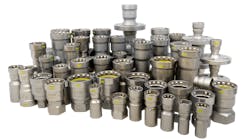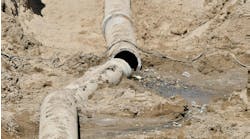TRENTON, N.J. — Fire sprinkler systems could soon be required in all new homes built in New Jersey. Just this past November, the New Jersey Assembly Housing and Local Government Committee passed Bill A3278, requiring fire suppression systems in one- and two-family homes. Now the bill heads to New Jersey’s Full Assembly. Senate bill S-2287 is also up for consideration.
If passed, to ensure compliance, the law would be enforced by a state or municipal enforcement agency and require a certificate of occupancy to be issued after a fire sprinkler system is installed in a home.
According to the Assembly Housing and Local Government Committee Statement to the Assembly with committee amendments, as amended this bill would extend the legislation requirements to manufactured homes; require the Commissioner of Community Affairs to modify the building sub-code of the State Uniform Construction Code, requiring fire suppression systems in all new one- and two-family homes; require new fire suppression systems to meet New Jersey regulations regarding backflow prevention; and require the commissioner’s modifications to make provision for installing separate shut-off valves and a meter for measuring water usage dedicated to fire suppression.
Related Articles:
N.H. H.B. 109 is passed, prohibits local government from requiring sprinkler installation
Related Articles:
Pa. H.B. 377 is signed, repeals fire sprinkler mandate
Assemblyman John Wisniewski, who has served as Chairman of the New Jersey Fire Safety Commission for ten years, said that there are a number of reasons to require the installation of fire suppression systems in newly constructed one- and two-family homes, the most obvious being that the systems save lives.
“In 2010, New Jersey recorded 75 deaths due to fire, including two firefighters,” said Wisniewski. “Nearly 80% of the civilian deaths occurred in residential properties. Beyond the lives that could be saved with sprinkler systems are the injuries that could be averted. New Jersey reported nearly 393 civilians and 737 firefighters injured by fires in 2010. These systems also reduce property damage from fire, smoke and the water used to fight the fire.”
According to Dave Kurasz, executive director of the New Jersey Fire Sprinkler Advisory Board, New Jersey’s elected officials have an opportunity to take a significant step to protect New Jersey residents from the dangers of fire.
“The top two reasons these bills should become law in New Jersey are the facts that fire sprinklers will save lives and are cost-neutral,” said Kurasz.
Kurasz also said the bill is needed to bring New Jersey’s building codes up to the minimum national standards, as outlined in the 2009 International Residential Code.
“To date, New Jersey has failed to adopt the sprinkler requirement section of the code, but has adopted the use of very flammable ‘lightweight’ construction materials, which leaves firefighters and residents only three minutes to escape during a fire,” explained Kurasz.
Kurasz noted that fire sprinklers pay for themselves over time.
“Before a fire even occurs, fire sprinklers are cost-efficient through insurance company discounts, offered by many insurers,” said Kurasz. “According to the Insurance Services Office, in most states, discounts are approximately 13% for full sprinkler protection, leading to yearly insurance savings. Fire sprinklers also can help increase the value of the property by making it more attractive to potential buyers. Additionally, sprinklers significantly reduce homeowners’ property losses.”
According to Jeffrey Shapiro, executive director of IRC Fire Sprinkler Coalition, legislators should recognize that building codes established many safety requirements to ensure that homes provide an appropriate level of safety for occupants, and fire sprinklers are now one of the basic safety features that every home should include.
“Every national model building code now requires fire sprinklers in all residential occupancies, not just new homes,” said Shapiro. “The requirement to include sprinklers as a standard feature in new homes recognizes that people are most at risk from fire in their own homes, particularly when they are sleeping. With all condominiums, apartments, hotels, motels, dormitories and every other occupancy where people sleep now requiring fire sprinklers, it simply makes no sense to leave people more vulnerable to fire in their own home than they would be in any other residential occupancy.”
Many opponents of legislation mandating fire sprinkler systems in homes use cost as a reason why fire sprinkler systems should not be required.
“I believe the fears about cost are exaggerated and that the true reason for opposition is the instinct all of us have to resist change,” said Wisniewski. “This is the same argument that has been used in the past to oppose safety initiatives such as seat belts or smoke alarms, which have since become widely accepted. The cost to install a sprinkler system in new construction is comparable to the cost of a marble or granite countertop that builders regularly install on speculative properties without any such fear. Amortized over the life of a 30 year mortgage, the cost comes to less than a cup of gourmet coffee once a week and even this minimal cost is offset by a reduction in premiums for homeowners insurance.”
Wisniewski added that instead of embracing their fears over sprinkler systems, home builders should recognize the marketing opportunities represented by the safer environment homes with fire sprinkler systems provide.
“Many homebuyers are families with growing children and having sprinkler systems installed could be the very feature that makes a new home stand out in a market crowded with older homes,” said Wisniewski.
John A. Viniello, president of the National Fire Sprinkler Association, told CONTRACTOR that if he were to address the New Jersey Assembly he would say that cost should be a minor factor because fire sprinkler systems save lives and protect property where the most fire deaths occur in this country – the home.
“New Jersey should have the political will to do something that helps people and doesn’t help vested interest,” said Viniello. “What the assembly should do is say this is the right thing to do, and by doing this they will send a message to other states, to show them that New Jersey had the courage and political will power to do the right thing for the citizens in New Jersey. Think of the lives they save of the people in the homes and in the fire service.”

